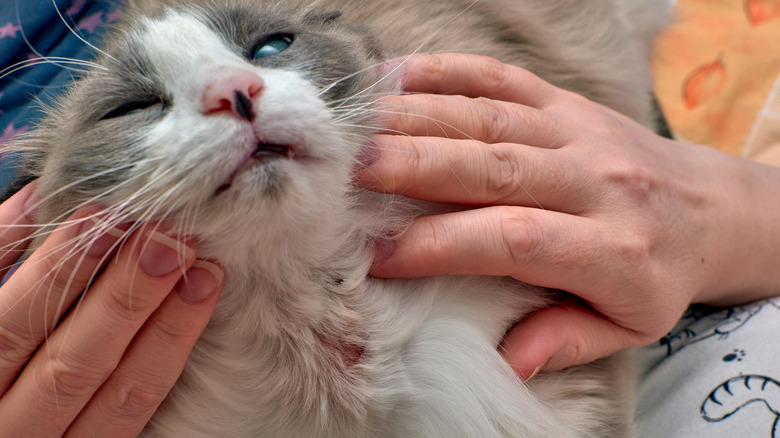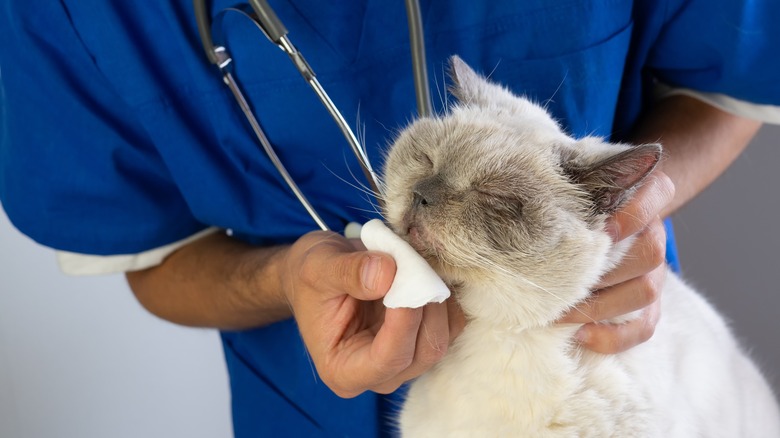These Are The Allergies That Can Affect Your Cat
If you're a proud and happy owner of a cat, you're privy to their unique social and personal traits that make them wonderful pets. Cats have a lot of different ways to show you they love you, and they are known to be relatively low-maintenance (via Pet Helpful).
Did you know that your feline friend can be affected by different kinds of allergies? Not much different from humans, your cat's immune system can react to foreign irritants — also known as allergens — and this will most commonly manifest in symptoms like itching and/or irritated skin, vomiting, diarrhea, etc., according to The Spruce Pets.
Understanding the various types of allergies that can cause discomfort and pain to your cat can feel like a daunting task, mainly because some of the symptoms overlap among the allergies, per VCA Animal Hospitals, but you might be encouraged to know that there are in fact ways to identify the different kinds of allergies.
There are several kinds of allergies that can affect your cat
Flea-related allergies, environmental allergies, and food allergies make up the three main types of allergies that can affect your cat, according to Pet Health Network, with the former two being the most common kinds.
When it comes to a flea allergy, one good way to distinguish between normal irritation caused by flea bites and an allergic reaction to the proteins or antigens in the flea's saliva, is to examine the severity of the way your cat reacts to the bite, per VCA Animal Hospitals. Your cat will chew and itch much more intensely if he or she is having an allergic reaction to a fleabite, often to the point of wounding and fur loss. Spots to examine include the base of the tail and areas around the head and neck. The scabs from wounds (or open sores) caused by the itching are known as "miliary dermatitis."
With environmental allergies, you may notice that many of them occur during certain seasons, though others are present all year long, per VCA Animal Hospitals. Symptoms often take the form of severe itching. Tree, dust, and weed pollens are some culprits when it comes to environmental allergies (via The Spruce Pets), as are molds and dust mites.
Food allergies are usually manifested with gastrointestinal symptoms, according to Pet Health Network, although you can't rule out itching and respiratory problems here as well (per VCA Animal Hospitals).
Diagnosing your cat's allergies
Diagnosing the allergies that are affecting your cat would require working with a veterinary professional, per Mission Vet, and may involve an examination of your cat's medical history and a physical test. Common mechanisms for allergy testing involve skin and blood tests (via Whisker Docs), although these aren't known to be effective in ruling out all possible causes, so they are only performed if the cat is going to receive allergy shots.
The most effective way to combat allergies is to remove the irritants from the cat's environment. If your vet thinks that this is not possible, then medications such as cortisone or steroid injections, antihistamines, and flea-prevention treatment could be prescribed (via Pet Health Network).
With food allergies, vets often recommend feeding your cat a hypoallergenic diet, which basically refers to a diet that includes a protein that your cat has not previously eaten, according to VCA Animal Hospitals. After providing this diet exclusively for about 12 weeks, if your cat doesn't show any negative reaction to the food, your vet might instruct you to start introducing your cat's old foods into the diet, carefully watching for an allergic reaction, reports All About Cats. If an allergy is confirmed, then your cat may be prescribed a special diet.
Unlike the many false things people believe about cats, allergies in cats are a very real and serious concern. You are better off understanding how to spot the warning symptoms so that you can get professional help at the right time.


